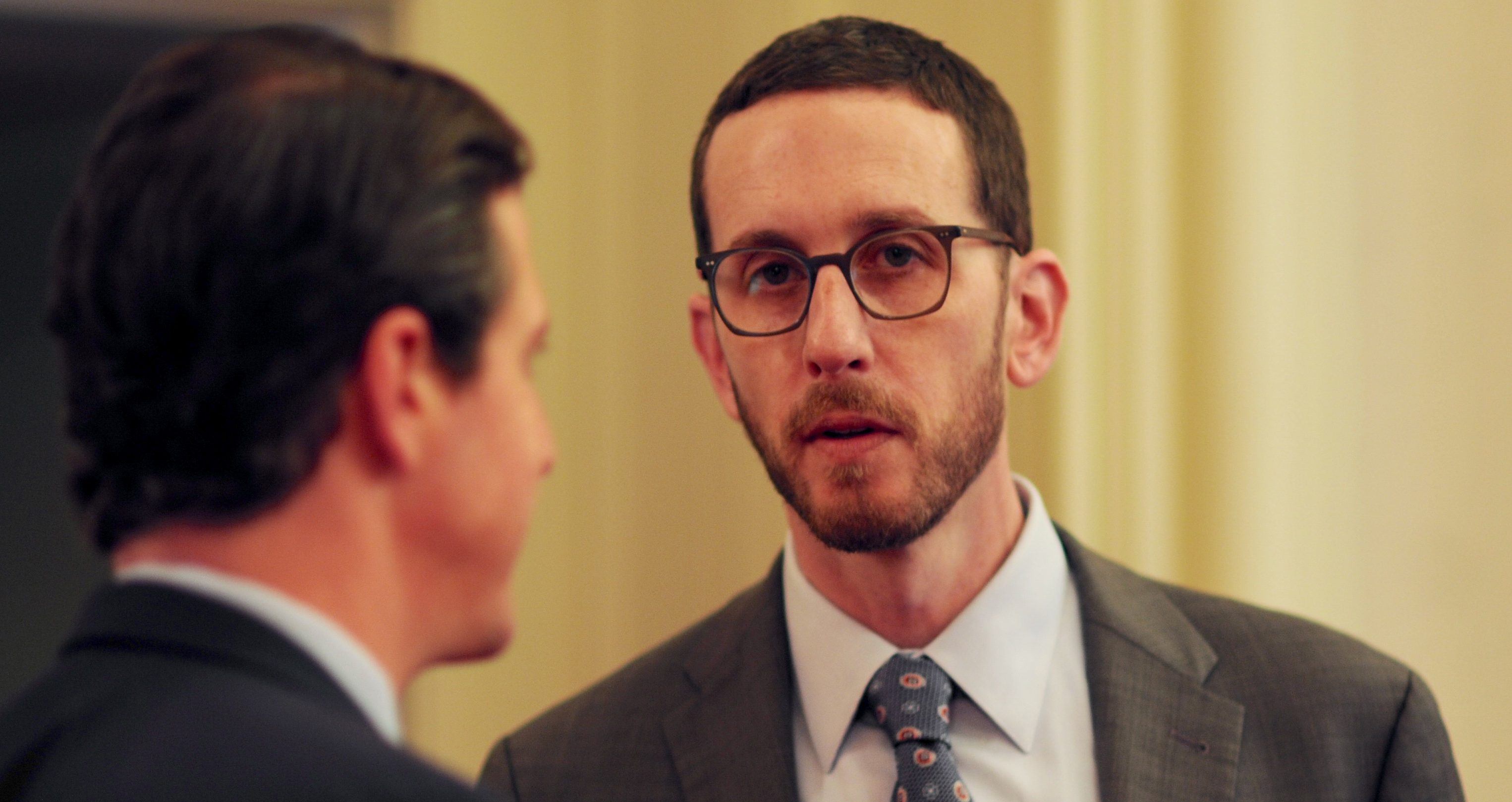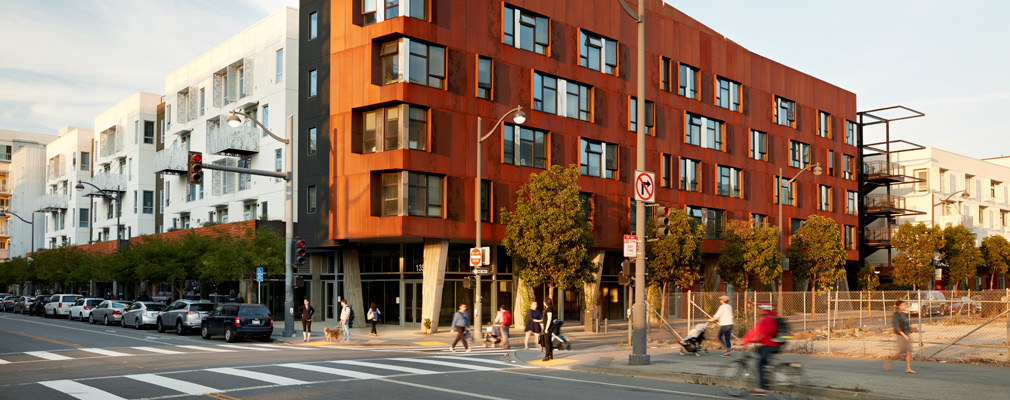
Senator Scott D. Wiener. (Photo: Kevin Sanders for California Globe)
Senator Wiener’s SB 10 ‘Light Touch’ Housing Density Bill Passes Assembly 41-9
‘These laws forced us to build luxury-only units and not affordable – and we actually want to build affordable’
By Evan Symon, August 24, 2021 2:44 am
A bill that would increase higher-density housing near transit areas regardless of previous zoning or CEQA requirements passed the Assembly 41-9 on Monday.
Senate Bill 10, authored by Senator Scott Wiener (D-San Francisco) would, minus any local zoning restrictions, authorize a local government to zone any parcel for up to 10 units if located in a traffic heavy or urban infill site. While local governments cannot pass a law to adopt this policy locally after 2029 under SB 10, any high density structure under the bill set up between the bills passage and then would not have to be passed by the California Environmental Quality Act (CEQA).
Essentially the bill would allow multiple unit housing to be placed on single-family and other zoned areas without CEQA approval as long as they were near transit or high traffic areas. Not all land would be covered under the bill for development, with the bill specifically prohibiting development on publicly owned land or re-designated publicly owned land for park or recreational purposes.
For areas with zoning restrictions in place, a 2/3rds vote will be needed to replace those local restrictions as well.
Senator Wiener has repeatedly tried to pass legislation for the last several years aimed at increasing denser housing, reducing local control on what can be built, and reducing single family housing in parts of the state. These failures, specifically of SB 50 early last year, forced Weiner to reduce, water down, and otherwise conform the bill to something more palatable for cities, developers, and citizens alike.
“California’s severe housing shortage requires many strategies, and making it easier and faster for cities to zone for multi-unit housing is a critical piece of the puzzle,” said Senator Wiener in a statement on Monday. “This voluntary tool will help local governments throughout California fundamentally reshape their zoning in infill areas, and help our state climb out of the housing crisis we face. Today is a step in the right direction, and we must continue to build on this victory to end California’s housing crisis.”
Affordable housing advocates praised SB 10’s passage as well, specifically pointing out the need to add denser housing near transit centers.
“Legalizing small apartment buildings near transit and in urban infill areas reduces environmental impacts and slashes climate pollution,” explained Brian Hanlon, CEO of California YIMBY. “SB 10 will make it easier for cities across our state to approve these types of homes, and put us on track to more sustainable, affordable, inclusive communities.”
Strong opposition to SB 10 despite bipartisan vote
However, SB 10 has remained strongly opposed by many developers and preservationists who see the bill as destructive and not encouraging more affordable development. Some developers even pointed out that the zoning laws have forced them to build mostly luxury units to recoup losses handed to them by the state and that the solution really involves a mix in keeping cheaper multi-unit housing up and selectively building new multi-unit housing where needed, not opening the floodgates all at once.
“There has been no real incentive for us to build, and it’s not because of the density laws. At all,” explained developer Martin Schules, who stopped building new housing in California two years ago in favor of other Western states. In an interview with the Globe, Schules said, “Take Los Angeles. Even with SB 10 and no CEQA, we still have to contend with a lot of laws that really bully against us building new places. First of all we have to, by law, include a parking spot. If we’re building above ground, that means wasted space for a lot. Below ground that means added costs. Then there is the green and common space requirements, also eating into the costs and space we have on a certain lot. Plus a lot of other cities have stricter environmental laws. One place in Pasadena we couldn’t build because locals didn’t want a palm tree to be chopped down. Out in Joshua Tree, developers are [screwed] because all this land they have with Joshua trees on it means that they can’t tear any down. So if they can’t build around, there’s no way they can do it. Developments are routinely vetoed.”
“In other states, like Nevada, not nearly as many scruples. But in California, even if you manage to build something you need to market it as a luxury place and have high rents to recoup your costs. Look at all the newer developments in LA and Bay areas. And San Diego. It’s nearly all luxury with very little affordable. Why? Because of all of these regulations eating into space and boosting cost. We have no other choice or we’re losing money. SB 10 does nothing for that.”
“What real estate folks are doing now is buying good ol’ one level 4 to 10 unit places and just letting them be. Maybe a slight up in rent, but nothing drastic. Two bedrooms shouldn’t be above $1,800 in cities. That way you get a lot of people putting in and you get to see which residents are best. Who can afford it it and them staying a long time. That’s a big trend in California right now. Landlord still makes money, things remain affordable, and no tear down or construction costs. Then keeping those up buys you goodwill for larger apartment complexes so you can justify more luxury apartments.”
“Save the older but good places keep costs low there so you can build in available areas and maybe squeak a few allowances past in terms of regulations. It’s the smart move. SB 10 really should have worked a plan like this, especially keeping up older, already built housing at affordable rent prices. You also win over both the YIMBY and NIMBY crowds, and even preservationists and people like that who also ruin zoning meetings. Wiener is really going about this the wrong way.”
“The thing I hate is that this makes developers look greedy. Well, ok, yes, we want to see a profit, so we are ‘greedy’ in that sense. But these laws forced us to build luxury only units and not affordable. And we actually want to build affordable. Do it right, and you can still make good money. But these laws. They’re altering the wrong ones.”
SB 10 is expected to be voted on in the Senate within the next week.
- Bill to Require Law Enforcement Disclosure if AI Was Used To Help Write Reports - August 7, 2025
- Gov. Newsom Files FOIA Request To ‘Expose True Cost’ Of L.A. Federal Troop Deployment for Anti-ICE Riots - August 6, 2025
- California Redistricting: How Newsom’s Plan Will Demolish Hard Fought GOP Gains - August 6, 2025








This Wiener is a grim reaper to California and its residents. He has introduced bills for lighter sentences for pedophiles (under the guise of gay rights) and now this. He is toxic. How does he and so many corrupt politicians remain in office as they destroy everything we care care about and everything we work so hard to achieve. In the next few years, California will become the land of illegals, government funded losers and the elite. Crime will triple with drug traffickers, human traffickers and child traffickers. You’ll soon see the next wave of Californians leaving. STOP VOTING FOR THESE LOSERS
Two words : San Franfreakshow
Sen Scott Weiner not only has a “vision” to put everyone in California in stack-and-pack housing (if possible) but he is clearly getting something out of this financially. Seems to me this zombie bill keeps coming back because developers finance his campaign. Two zombies: This housing bill back from the dead and Sen Scott Weiner, stumbling along in office. Thoroughly sick and tired of disgusting legislators like Weiner.
I just wrote to my State Senator. Write to yours, too, urging a NO vote on SB 10. Unless, of course, your state senator is Scott Weiner, in which case it probably wouldn’t do any good.
Find contact information to email or call your state senator here:
https://www.senate.ca.gov/senators
California does not have a housing shortage. It has an over-population problem.
You get rid of the 5 million illegal aliens here and you will have plenty of housing.
Well,they say the population is now shrinking!
“Two bedrooms shouldn’t be above $1,800 in cities.” Are you serious?!! You would be lucky to find that rent in the suburban Inland Empire of Southern California, let alone Los Angeles. Senator Scott Wiener has only managed to get his real estate buddies and himself richer with all the housing legislation that he has gotten passed.